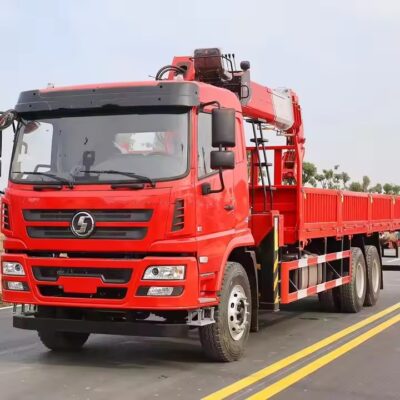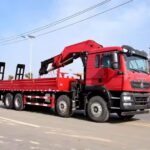SUMMARY
Leti'e' Beyond C300 125-Horsepower 4X2 4-Ton Wrecker is a practical vehicle for vehicle recovery operations.
1. Power and Mobility
- Yéetel 125 tsíimin u muuk', this wrecker offers sufficient power to handle a variety of towing tasks. It can pull disabled vehicles of different sizes with relative ease.
- The 4X2 drive configuration provides a good balance between traction and fuel efficiency. It allows the wrecker to move smoothly on various road surfaces.
- With a 4-ton towing capacity, it is suitable for handling medium-sized vehicles.
2. Towing Capacity and Equipment
- It is designed with a specific towing capacity suitable for common breakdowns. The wrecker likely comes equipped with a winch system for pulling vehicles onto its flatbed or towing them directly.
- It may also have additional features such as tie-downs and storage compartments for tools and equipment needed for recovery operations.
3. Application Areas
- In urban areas, it can quickly respond to accidents and breakdowns, helping to clear the roads and reduce traffic congestion.
- On highways, it can assist in towing disabled vehicles to safety, ensuring the smooth flow of traffic.
4. Operator-Focused Design
- The operator’s cab is likely designed for comfort and convenience. It may have ergonomic seating and controls that allow the operator to work for extended periods without excessive fatigue.
- The controls are probably intuitive and easy to use, enabling the operator to perform towing and recovery operations efficiently.
NOJ
Leti'e' Beyond C300 125-Horsepower 4X2 4-Ton Wrecker is a specialized vehicle with several notable features for efficient vehicle recovery.
1. Engine Power and Drive Configuration
- Moderate yet Capable Engine: The 125-horsepower engine provides a reliable source of power for the wrecker. While not overly powerful, it is sufficient for handling a wide range of towing tasks for medium-sized vehicles. The engine offers smooth operation and decent acceleration, enabling the wrecker to respond quickly to calls and reach the location of a disabled vehicle in a timely manner.
- 4X2 Drive for Versatility: The 4X2 drive configuration offers a balance between traction and fuel efficiency. It allows the wrecker to move smoothly on different road surfaces, from city streets to highways and rural roads. The two-wheel drive on the rear axle provides enough power for towing, while the front wheels offer steering control and maneuverability. This drive setup also makes the vehicle more fuel-efficient compared to larger drive configurations, reducing operating costs.
2. Towing Capacity and Equipment
- 4-Ton Towing Capacity: With a 4-ton towing capacity, the Beyond C300 wrecker is designed to handle medium-sized vehicles. It can handle a variety of vehicle breakdowns and accidents, ensuring that disabled vehicles can be safely towed to a repair facility or a designated location. The towing mechanism is engineered to be sturdy and reliable, capable of withstanding the stress of pulling heavy loads without compromising safety or performance.
- Winch System for Efficient Recovery: Equipped with a winch system, the wrecker can perform a variety of recovery operations. The winch is typically powerful enough to pull a vehicle onto the flatbed or tow it from a difficult location. It may have features such as variable speed control and a long cable length, providing flexibility in different recovery situations. The winch is also designed for durability and ease of use, with controls that are accessible and intuitive for the operator.
- Additional Equipment for Enhanced Functionality: In addition to the winch, the wrecker may come with other useful equipment. Tie-downs are often provided to secure the towed vehicle on the flatbed, preventing it from shifting during transport. Storage compartments may be available for tools and equipment needed for recovery operations, such as jumper cables, tire repair kits, and basic hand tools. These additional features enhance the wrecker’s functionality and make it more self-sufficient on the job.
3. Body and Loading Design
- Functional Flatbed or Towing Arrangement: The body of the wrecker is designed to facilitate easy loading and towing of disabled vehicles. If it has a flatbed, it is likely made of durable materials that can withstand the weight and stress of loading and transporting vehicles. The flatbed may have ramps for easy vehicle access and tie-down points to secure the load. Ichil yaan, the wrecker may have a towing mechanism that allows for traditional towing operations, with a tow bar or hitch that is compatible with different types of vehicles.
- Thoughtful Design for Accessibility and Loading: The design of the wrecker takes into account the ease of loading and unloading disabled vehicles. The ramps, if present, are likely designed to be sturdy yet lightweight and easy to deploy. They may be adjustable to accommodate different vehicle heights and angles. The body may also have features such as side rails and non-slip surfaces to ensure the safety of the operator and the towed vehicle during loading and unloading. Adicionalmente, there may be lighting and signage on the body to enhance visibility during night operations or in low-light conditions.
4. Safety and Control Features
- Safety in Towing Operations: The Beyond C300 wrecker is equipped with safety features to ensure a secure towing operation. Load-sensing systems may be in place to monitor the weight and balance of the towed vehicle. If the load exceeds safe limits or becomes unbalanced, the operator is alerted. The towing connections, such as the tow bar or winch cable, are designed with safety in mind, with features like locking mechanisms and high-strength materials to prevent accidental detachment. The vehicle may also have stability control systems and anti-lock brakes to enhance safety during towing and driving.
- Operator-Controlled Systems for Precision: The controls in the operator’s cab are designed for ease of use and precision. The operator can easily manage the winch, ramps, and other recovery equipment. The controls are likely ergonomically placed and intuitive, reducing the risk of operator error. There may also be safety interlocks and warning systems to prevent accidental activation of certain functions. The cab may be equipped with a rear-view camera or mirrors to provide a clear view of the towed vehicle and surrounding area, enhancing safety during towing operations.
5. Operator-Focused Design
- Comfortable Cab for Extended Operations: The operator’s cab is designed with the operator’s comfort in mind. Ergonomic seating provides proper support during long hours of operation, reducing fatigue. The cab is likely insulated from noise and vibration to create a more pleasant working environment. Climate-control systems may be installed to maintain a comfortable temperature inside the cab regardless of the external weather conditions.
- Visibility and Instrumentation for Optimal Performance: Good visibility is crucial for the operator during towing and recovery operations. The cab is designed with large windows and well-placed mirrors to provide a clear view of the surrounding area. The instrumentation panel may display important information such as engine status, towing load, and vehicle stability indicators. This information helps the operator make informed decisions and ensure safe and efficient operations. Adicionalmente, there may be communication systems in the cab to allow the operator to stay in touch with dispatchers or other emergency services.
SPECIFICATIONS
| A'alajil t'aan yanak | |
| Bix u unidad | 4X 2 |
| Batalla | 3308milímetro |
| Vehicle body size | 5.995×2.3×2.265 meters |
| Juuch' total | 4.49 Toneladas |
| Juuch' le vehículo | 4.05 Toneladas |
| Velocidad wóolis | 105kilómetro leti' h |
| Front wheel track/rear wheel track | Front track: 1591milímetro, rear track:1485milímetro |
| Voladizo delantero leti' voladizo trasero | 1.118/1.569 Metros |
| Parámetros le kisbuuts'o' | |
| Bix kisbuuts'o' | Shangchai SC28R125Q5A |
| Desplazamiento | 2.776L |
| Potencia wóolis | 125 tsíimin u muuk' |
| Potencia wóolis salida | 92kW |
| Bin yano'ob combustible | Gasóleo |
| Norma emisión | National V |
| Mounted Equipment Parameters | |
| Anuncio le vehículo | JYD5040TQZPYJ5 |
| Mounted equipment brand | Jinwang brand |
| Parámetros yaantal | |
| Bix u yaantal | 5-speed transmission |
| Meyaj ku marchas | 5 engranaje |
| Meyaj ku marchas paachil | 1 |
| Parámetros le chasis | |
| Marca le chasis | SAIC Yuejin |
| Chassis vehicle series | Beyond C series |
| Bix chasis | NJ1042ZFDCMZ |
| Meyaj ku ballestas | 8/8+9 |
| Neumáticos | |
| Meyaj ku neumáticos | 6 |
| Especificaciones le neumáticos | 7.00R16LT 8PR |
Artículos Relacionados:




































Comentarios
Mina'an valoraciones láayli'.